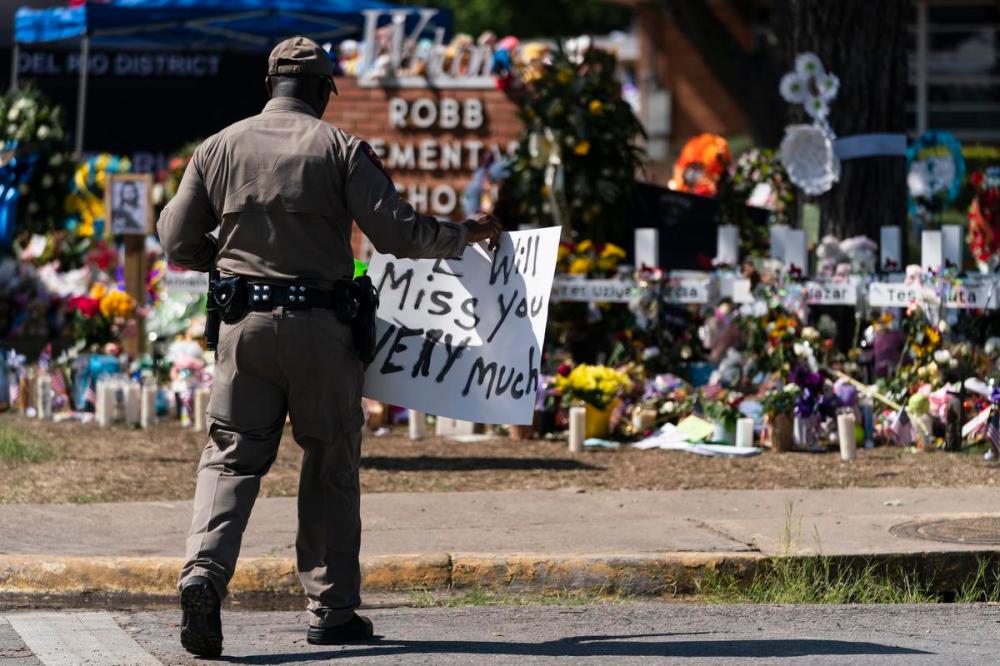Reflexively linking violence with mental illness hurts victims of both
Advertisement
Read this article for free:
or
Already have an account? Log in here »
To continue reading, please subscribe:
Monthly Digital Subscription
$1 per week for 24 weeks*
- Enjoy unlimited reading on winnipegfreepress.com
- Read the E-Edition, our digital replica newspaper
- Access News Break, our award-winning app
- Play interactive puzzles
*Billed as $4 plus GST every four weeks. Offer only available to new and qualified returning subscribers. Cancel any time.
Read unlimited articles for free today:
or
Already have an account? Log in here »
Hey there, time traveller!
This article was published 30/05/2022 (1008 days ago), so information in it may no longer be current.
It appears that American Republican politicians have a new slogan in their war on gun law reform: Guns don’t kill people; mentally ill people do.
Texas Governor Greg Abbott, for example, was quick to blame mental illness for the massacre of 19 children and two teachers at an elementary school in Uvalde this past week. Never mind that Abbott failed to provide any evidence that the shooter was mentally ill; his actions themselves are apparently all the evidence you need.
Similarly, many people automatically assumed mental illness was the culprit in the mass killing of 10 people at a grocery store in Buffalo, N.Y., earlier this month. The shooter had previously been the subject of a mental health evaluation but had not been diagnosed with an illness.

As if aware that people would attribute his actions to mental illness, he wrote an online message before the massacre stating “I was never diagnosed with a mental disability or disorder.”
Nonetheless, since we don’t understand how people could commit such atrocities, we — and this includes people of all political persuasions, not just Republican politicians — search for any plausible-sounding explanation. In times past, people would conclude that the devil made them do it; now, we’re sure mental illness is the culprit.
Now, granted, there are limited circumstances in which mental illness is associated with serious violence. The American Psychological Association notes that one influential study discovered a correlation between violence and two symptoms: Persecutory delusions, such as believing someone has planted a tracking device under their skin, and “command” hallucinations — hearing voices ordering the patient to harm someone.
However, such symptoms, which are commonly associated with paranoid schizophrenia, respond well to therapy with antipsychotic medications, and hence treatment is an essential element in reducing the risk of violence.
In any case, paranoid schizophrenia accounts for a small percentage of people diagnosed with a mental disorder. Yet the assumption that mental illness is always inextricably linked to violence comes at a high price, particularly for the one in five Canadians who will experience mental health problems during their lifetime.
Stigma has long been and continues to be a serious problem. It can adversely affect every aspect of people’s lives, from their relationships to their employment, education, housing and health care.
And since unemployment, poverty and housing insecurity are all factors associated with violence, stigma, rather than mental illness itself, frequently increases the risk of violent behaviour. Indeed, the MacArthur Violence Risk Assessment demonstrated that people with mental illness are no more violent than other people who live in the same neighbourhood.
Furthermore, stigma increases the risk that mentally ill people will themselves become victims of violence. According to Statistics Canada, 69 per cent of people with mental health disabilities reported having been physically or sexually assaulted, compared with 36 per cent of the general population. And sadly, being victimized increases the risk one will act out violently.
Stigma and its consequences are therefore often responsible for violence. But if someone with a diagnosed mental disorder does commit a violent act, we still assume it was the result of the disorder, rather than the result of stigma and its associated socioeconomic factors.
To make the stigma salient: Imagine learning that a violent offender has a heart condition, and automatically assuming it was the disease that caused the violence. We would, appropriately, consider that an absurd inference.
Yet we still don’t see the absurdity of reflexively associating mental illness and violence. And until we do, we do a disservice to survivors of both.


